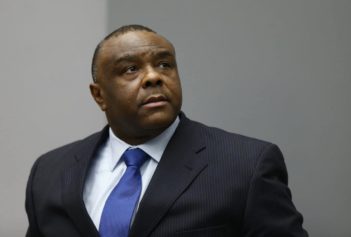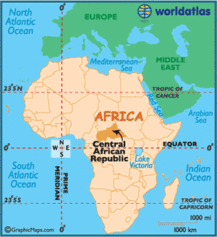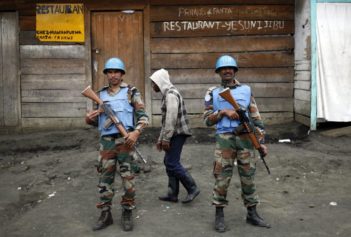An already tenuous political climate in the Central African Republic has gotten tenser as rebel fighters are moving toward the capital city of Bangui, forcing the United States to warn U.S. citizens to evacuate and the UN to order its workers to leave.
Bordering the troubled nations of Sudan and the Congo, the Central African Republic (CAR) is yet another nation in central Africa where government is struggling to maintain order as rebels insist on disorder. With a population of about 4.4 million, CAR is a former French colony that has experienced considerable political discord since winning its independence in 1960. It wasn’t until 1993 that the country held its first multi-party democratic elections, after being ruled by a series of military leaders who took power by force.
Though the current president, General Francois Bozize, won democratic elections in 2005 and again in 2011, he actually came to power by force in 2003, overthrowing the previous president Ange-Félix Patassé. With such a history, it doesn’t come as a surprise to many that a new generation of rebels has emerged to try to seize power from Bozize.
The rebel group, known as Seleka, made up of factions from three former armed groups, accuses Bozize of failing to honor a 2007 peace deal that stipulated they would be paid if they laid down their arms.
CAR has an abundance of mineral resources such as oil, gold and diamonds, but much of it is bought and sold in an underground black market that does not benefit most of CAR, considered one of the poorest countries in the world—though its Human Development Index ranking of 179 out of 187 countries is considered deceptive because so many CAR residents sell their excess food crops and the alcohol that many women make from excess food on a black market.
After demonstrators attacked the French embassy in Bangui, demanding that their former colonizer help them in pushing back the rebels, who are only 47 miles away from the capital city, French President Francois Hollande deployed troops to protect its embassy—but said France wouldn’t get involved with the rebels.
“If we have a presence, it’s not to protect a regime, it’s to protect our nationals and our interests and in no way to intervene in the internal business of a country, in this case the Central African Republic,” Hollande said. “Those days are over.”
The U.S. Department of State has warned U.S. citizens against all but essential travel outside Bangui and on Sunday authorized the departure of non-emergency personnel in Bangui.
“U.S. citizens should review their personal security situation and consider taking advantage of commercial flights,” the department said.
“Armed militia groups, bandits and poachers present real dangers, and the Central African government is unable to guarantee the safety of visitors in most parts of the country,” it said. “There have been repeated attacks on Central African and expatriate travelers in the countryside. Attacks in past months have occurred as close as 70 kilometers from Bangui. Poachers and armed men also pose a threat to game hunters in northern and eastern CAR. The Lord’s Resistance Army poses a similar threat to hunters in eastern CAR.”
The Lord’s Resistance Army is led by infamous fugitive warlord Joseph Kony.
The United Nations on Wednesday ordered more than 200 non-essential staff and families of other workers to leave.
“The temporary relocation is a precautionary measure to reduce our presence in the event the security situation further deteriorates in Bangui,” UN spokesman Martin Nesirky said.
He added that the rebels’ “contradictory messages and their continued military offensive seem to indicate that they might be intent on taking Bangui,” he added.


